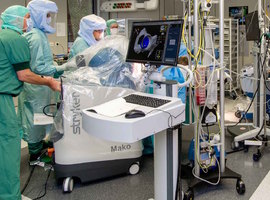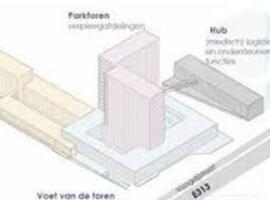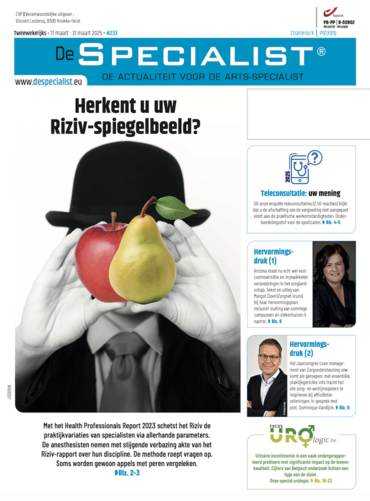1. Coucke P. Médecine du futur. L’intelligence artificielle au chevet des patients. Éditions Mardaga 2020, Bruxelles - Belgique. ISBN 9782804708160.
2. Coucke P. COVID-19: de la crise aux opportunités; le coronavirus, un accélérateur de changement qui force l’innovation? Éditions Mardaga 2021, Bruxelles – Belgique. ISBN 9782804709518. Version numérique ISBN9782804709525.
3. Adams K. Ezra earns FDA clearance for AI tool that makes MRI’s faster and cheaper. MedCityNews, juin 2023. https://medcitynews.com/2023/06/fda-artificial-intelligence-ai-mri-cancer-healthcare. Dernière consultation en ligne le 10 novembre 2023.
4. Sundar LKS, Yu J, Muzik O, et al. Fully automated, semantic segmentation of whole body 18F-FDG PET/CT images based on data-centric artificial intelligence. J Nucl Med 2022;63(12):1941-8.
5. Alhuseinalkhudhur A, Lindman H, Liss P, et al. Human epidermal growth factor receptor 2 targeting (68Ga)Ga-ABY-025 PET/CT predicts early metabolic response in metastatic breast cancer. J Nucl Med 2023;64(9):1364-70.
6. McGale J, Khurana S, Huang A, et al. PET/CT and SPECT/CT imaging of HER-2 positive breast cancer. J Clin Med 2023;12(15):4882.
7. Chen Y, Taib AG, Darker IT, James JJ. Performance of breast cancer detection AI algorithm using the personal performance in mammographic screening scheme. Radiol 2023;308(3):e222399.
8. Dembrower K, Crippa A, Colón E, et al. Artificial intelligence for breast cancer detection in screening mammography in Sweden: a prospective, population-based, paired-redaer, non-inferiority study. Lancet Digit health 2023;5(10):e703-e711.
9. Larsen M, Aglen CF, Lee CI, et al. Artificial intelligence evaluation of 122,969 mammography examinations from a population-based screening program. Radiology 2022;303(3):502-11.
10. Freeman K, Geppert J, Stinton C, et al. Use of artificial intelligence for image analysis in breast cancer screening programs: systematic review of test accuracy. BMJ 2021; 374:n1872.
11. Ang A. Lunit lends hands to Sweden’s national cancer screening program. Mobihealthnews 2023. https://www.mobihealthnews.com/news/emea/lunit-lends-hands-swedens-national-cancer-screening-programme Dernière consultation en ligne, le 10 novembre 2023.
12. Dratsch T, Chen X, Mehrizi M, et al. Automation bias in mammography: the impact of artificial intelligence BI-RADS suggestions on reader performance. Radiology 2023;307(4). https://doi.org/10.1148/radiol.222176
13. Nam JG, Hwang EJ, Kim J, et al. AI improves nodule detection on chest radiographs in a health screening population: a randomized controlled trial. Radiology 2023;307(2):e221894.
14. Tiu E, Talius E, Patel P, et al. Expert-level detection of pathologies from unannotated chest X-ray images via self-supervised learning. Nat Biomed Eng 2022;6:1399-406.
15. Causey JL, Zhang J, Ma S, et al. Highly accurate model for prediction of lung nodule malignancy with CT scans. Sci Rep 2018;8:9286.
16. Jacobs C, Setio AAA, Scholten ET, et al. Deep learning for lung cancer detection on screening CT scans: results of a large-scale public competition and an observer study with 11 radiologists. Radiol Artif Intell 2021;3(6):e210027.
17. Mikhael PG, Wohlwend J, Yala A, et al. Sybil: a validated deep learning model to predict future lung cancer risk from a single low-dose chest computed tomography. J Clin Oncol 2023;41(12):2191-200.
18. Xu K, Khan MS, Li TZ, et al. AI body composition in lung cancer screening: added value beyond lung cancer detection. Radiol 2023;308(1). https://doi.org/10.1148/radiol.222937.
19. Sverzellati N, Marrochio C. Deep learning based radiomics: pacing immunotherapy in lung cancer. Lancet Dig Health 2023;5(7):e396-e397.
20. Saad MB, Hong L, Aminu M, et al. Predicting benefit from immune checkpoint inhibitors in patients with non-small-cell lung cancer by CT-based ensemble deep learning: a retrospective study. Lancet Dig Health 2023;5(7):e404-e420.
21. Chung J. A more predictive and preventive cardiothoracic imaging interpretation model to avoid delayed diagnoses. MedCityNews August 2023. https://medcitynews.com/2023/08/a-more-predictive-and-preventive-cardiothoracic-imaging-interpretation-model-to-avoid-delayed-diagnoses/ Dernière consultation en ligne le 10 novembre 2023.
22. Bychkov A, Schubert M. Constant demand, patchy supply. https://thepathologist.com/outside-the-lab/constant-demand-patchy-supply Dernière consultation en ligne, le 10 novembre 2023.
23. Mageit S. UK rolls out AI-based cancer detection for NHS patients. Healthcare IT News 2020, https://www.healthcareitnews.com/news/emea/uk-rolls-out-ai-based-cancer-detection-nhs-patients Dernière consultation en ligne, le 10 novembre 2023.
24. Häger S. Will not using image analysis in pathology be perceived as irresponsible? Linkedin 2017 https://www.linkedin.com/pulse/using-image-analysis-pathology-perceived-simon-hager/ Dernière consultation en ligne, le 10 novembre 2023.
25. Cheikh JN, Nikulina B, Ma N, et al. (2023). Mapping the spatial proteome of head and neck tumors: key immune mediators and metabolic determinants in the tumor microenvironment. GEN Biotechnology 2023;2:418-34.
26. Dolgalev I, Zhou H, Murrell N, et al. Inflammation in the tumor-adjacent lung as a predictor of clinical outcome in lung adenocarcinoma. Nat Communic 2023;14(1):6764.
27. Pantanowitz L, Quiroga-Garza GM, Bien L, et al. An artificial intelligence algorithm for prostate cancer diagnosis in whole slide images of core needle biopsy: a blinded clinical validation and deployment study. Lancet Digit Health 2020;2(8):e407-e416.
28. Reuter E. Memorial Sloan Kettering spinout gets first FDA clearance for AI to detect prostate cancer. MedCityNews 2021, https://medcitynews.com/2021/09/memorial-sloan-kettering-spinout-gets-first-fda-clearance-for-ai-to-detect-prostate-cancer Dernière consultation en ligne le 10 novembre 2023.
29. Ang A. 5 South Korean hospitals to try out Deep Bio’s AI support tool for prostate cancer diagnosis. Healthcare IT News 2022, https://www.healthcareitnews.com/news/asia/5-south-korean-hospitals-try-out-deep-bios-ai-support-tool-prostate-cancer-diagnosis Dernière consultation en ligne le 10 novembre 2023.
30. Marin J. Owkin lance un consortium pour améliorer le traitement contre les cancers grâce à l’IA. L’usine Digitale 2023 ; https://www.usine-digitale.fr/article/owkin-lance-un-consortium-pour-ameliorer-le-traitement-contre-les-cancers-grace-a-l-ia.N2116756 Dernière consultation en ligne le 10 novembre 2023.
31. Tsai PC, Lee TH, Kuo KC, et al. Histopathology images predict multi-omics aberrations and prognoses in colorectal cancer patients. Nat Commun 2023;14(1):2102.
32. Wagner SJ, Reisenbüchler D, west NP, et al. Transformer-based biomarker prediction from colorectal cancer histology: a large-scale multicentric study. Cancer Cell 2023;41(9):1650-61.
33. Hollon T, Jiang C, Chowdury A, et al. Artificial-intelligence-based molecular classification of diffuse gliomas using rapid label-free optical imaging. Nat Med 2023;29(4):828-32.
34. Patel KB, Tabriz AA, Turner K, et al. Telemedicine adoption in an NCI-designated cancer center during the COVID-19 pandemic: a report on patient experience of care. J Natl Comp Canc Netw 2023;21(5):496-502.
35. Topol E. Landmark digital medicine trial: patient-generated data improve cancer survival. Medscape Oncology 2017. https://www.medscape.com/viewarticle/881243 dernière consultation en ligne le 10 novembre 2023.
36. Mulcahy N. Web app ups lung cancer survival by 7 months. Medscape 2016. https://www.medscape.com/viewarticle/864564?form=fpf dernière consultation en ligne, le 10 novembre 2023.
37. Mesltrom LG, Rodin AS, Rossi LA, et al. Patient generated health data and electronic health record integration in oncologic surgery. A call for artificial intelligence and machine learning. J Surg Oncol 2021;123(1):52-60.
38. Vitard A. La start-up français DirectoSanté lance une solution de télésuivi pour les malades du cancer avec Bayer. L’Usine Digitale 2020. https://www.usine-digitale.fr/article/la-start-up-francaise-directosante-lance-une-solution-de-telesuivi-pour-les-malades-du-cancer-avec-bayer.N998829 Dernière consultation en ligne le 10 novembre 2023.
39. Vercell A, Gasteiger N, Yorke J, Dowding D. Patient-facing mobile apps that enable patient reported outcome data to be collected: a systematic review of content, functionality, quality, and ability to integrate with electronic health records. Int J Med Inform 2023, 170: 104931.
40. Patel KB, Turner K, Tabriz AA, et al. Estimated indirect cost savings of using telehealth among nonelderly patients with cancer. JAMA Netw Open 2023;6(1):e2250211.
41. Gresham W, Hendifart AE, Spiegel B, et al. Wearable activity monitors to assess performance status and predict clinical outcomes in advanced cancer patients. NPJ Digit Med 2018;5(1):27.
42. Vaidya A. Mayo Clinic strikes remote patient monitoring partnership with NXgenPort. MedCityNews 2021; https://medcitynews.com/2021/05/mayo-clinic-strikes-remote-patient-monitoring-partnership-with-nxgenport/ Dernière consultation en ligne, le 10 novembre 2023.
43. Medgadget editors. Siemens epoc NXS Host Mobile Computer cleared to help point of care blood testing. Medgadget 2020. https://www.medgadget.com/2020/12/siemens-epoc-nxs-host-mobile-computer-cleared-to-help-with-point-of-care-blood-testing.html Dernière consultation en ligne, le 10 novembre 2023.
44. Adams K. Withings unveils urine analysis device that sits in your toilet bowl. MedCityNews 2023. https://medcitynews.com/2023/01/withings-unveils-urine-analysis-device-that-sits-in-your-toilet-bowl/ Dernière consultation en ligne, le 10 novembre 2023.
45. Vitard A. La Haute Autorité de santé prépare la généralisation du remboursement de la télésurveillance médicale. L’usine Digitale 2022. https://www.usine-digitale.fr/article/la-haute-autorite-de-sante-prepare-la-generalisation-du-remboursement-de-la-telesurveillance-medicale.N1778282 Dernière consultation en ligne, le 10 novembre 2023.
46. COVID-19 Le télémonitoring des patients est envisageable à l’avenir mais doit être peaufiné (KCE) MediQuality Medscape 2022. https://www.mediquality.net/be-fr/news/article/B1100378549_B1/covid-19-le-telemonitoring-des-patients-est-envisageable-a-l-avenir-mais-doit-etre-peaufine-kce Dernière consultation en ligne, le 10 novembre 2023.
47. Lath G, Rhee R, Nikam K. Digital therapeutics in oncology: a better outlook for cancer patients in the future. J Artificial Intelligence and Big Data 2022;2(1):1-8.
48. Gussoni G, Ravot E, Zecchina M, et al. Digital therapeutics in oncology: findings barriers and prospects. A narrative review. Annals Res Oncol 2022;2(1):55-69.
49. Aapro M, Bossi P, Dasari A, et al. Digital health for optimal supportive care in oncology.: benefits, limits and future perspectives. Supportive Care in cancer 2020;28:4589-612.
50. Ning Y, Jia Z, Zhu R, et al. Effect and feasibility of gamification interventions for improving physical activity and health-related outcomes in cancer survivors: an early systemic review and meta-analysis. Support care Cancer 2022;31(1):92.
51. Sammut S-J, Crispin-Ortuzar M, Chin S-F, et al. Multi-omic machine learning predictor of breast cancer therapy response. Nature 2022;601:623-9.
52. Johansson HJ, Socciarelli F, Vacanti NM, et al. Breast Cancer quantitative proteome and proteogenomic landscape. Nat Communic 2019;10(1):1600.
53. Rossi C, Cicalini I, Cufaro MC, et al. Breast cancer in the era of integrating “omics” approaches. Oncogenesis 2022;11(1):017.
54. Zitvogel L, Ma Y, Raoult D, Kroemer G, Gajewski TF. The microbiome in cancer immunotherapy: diagnostic tools and therapeutic strategies. Science 2018;359(6382):1366-70.
55. Park JS, Gazzaniga FS, Wu M, et al. Targeting PD-L2-RGMb overcomes microbiome-related immunotherapy resistance. Nature 2023;617(7960):377-85.
56. Soto-Pantoja DR, Gaber M, Arnone AA, et al. Diet alters entero-mammary signaling to regulate the breast microbiome and tumorigenesis. Cancer Res 2021;81(14):3890-904.
57. Davar D, Dzutsev AK, McCulloch JA, et al. Fecal microbiota transplant overcomes resistance to anti-PD1 therapy in melanoma patients. Science 2021;371(6529):595-602.
58. Vogtman E, Hua X, Yu G, et al. The oral microbiome and lung cancer risk: an analysis of 3 prospective cohort studies. J Natl Cancer Inst 2022;114(11):1501-10.
59. Stasiewicz M, Karpiński TM. The oral microbiome and its role in carcinogenesis. Semin cancer biol 2022;86(Pt3):633-42.
60. Comstock J. Precision medicine will require a lot more than just sequencing. MobiHealthNews 2016; https://www.mobihealthnews.com/content/precision-medicine-will-require-lot-more-just-sequencing Dernière consultation en ligne, le 13 novembre 2023.
61. Deutsch I, Vorobiof D. Leveraging aggregated data from patient communities to improve cancer care. MedCityNews 2022. https://medcitynews.com/2022/02/leveraging-aggregated-data-from-patient-communities-to-improve-cancer-care/ Dernière consultation en ligne, le 13 novembre 2023.
62. Long S. How a pandemic shines a brighter light on the need for SDoH innovation. MedCityNews 2021. https://medcitynews.com/2021/11/how-a-pandemic-shines-a-brighter-light-on-the-need-for-sdoh-innovation/ Dernière consultation en ligne, le 13 novembre 2023.
63. Lone N, McPeake J, Stewart NI, et al. Influence of socioeconomic deprivation on interventions and outcomes for patients admitted with COVID-19 to critical care units in Scotland: a national cohort study. Lancet Reg Health Eur 2021;1:100005.
64. Wang F, Gao Y, Yu Y, et al. A systematic review and meta-analysis of 90 cohort studies of social isolation, loneliness and mortality. Nature Human Behaviour 2023;7:1307-19.
65. Boen CE, Barrow DA, Bensen JT, et al. Social relationship, inflammation and cancer survival. Cancer Epidemiol biomarkers Prev 2018;27(5):541-9.
66. National Institute of Health News Releases 2023. Pragmatica-Lung Study a streamlined model for future cancer clinical trials, begins enrolling patients. NIH News releases 2023; https://www.nih.gov/news-events/news-releases/pragmatica-lung-study-streamlined-model-future-cancer-clinical-trials-begins-enrolling-patients Dernière consultation en ligne, le 13 novembre 2023

















